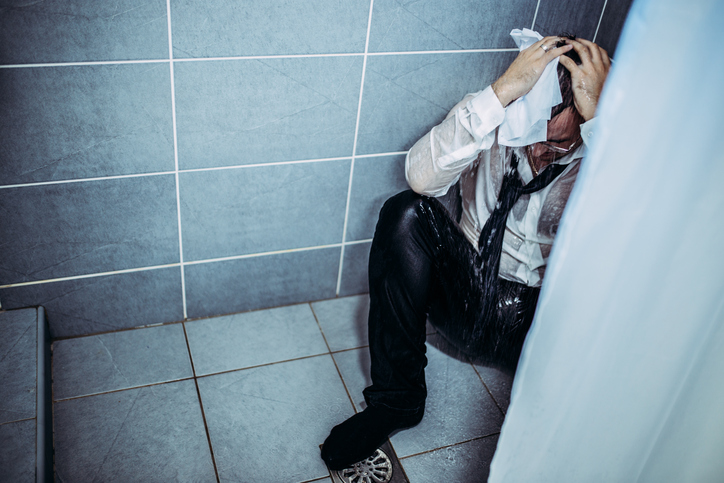 Depression is one of the most common mental health issues treated in therapy. Long-term trends in research data suggest more and more people are experiencing depression every year. This holds true for most ethnicities, ages, and genders.
Depression is one of the most common mental health issues treated in therapy. Long-term trends in research data suggest more and more people are experiencing depression every year. This holds true for most ethnicities, ages, and genders.
Depression can be treated. It is a mental health concern, not a personality flaw. There are many therapies which can help someone reduce their symptoms and regain happiness. With help from a mental health professional, recovery is possible.
- What to Expect in Depression Therapy
- Medication for Depression
- Complementary and Alternative Medicine
- Lifestyle Changes to Help Depression
- Hospitalization for Depression
- Depression Therapy Case Examples
- Seeking Therapy for Depression
What to Expect in Depression Therapy
In a typical first therapy session for depression, a therapist will go through an evaluation with you to assess your symptoms and goals. This evaluation can also determine whether there are any other co-occurring physical or mental health factors to consider. Co-occuring conditions often affect the course of therapy.
A trained therapist can help you view depression’s symptoms without judgment. Many people feel relief when they learn they are not alone in their experience. A therapist can help you recognize your own strengths and use these assets to change and grow.
The therapist can also help you understand why you may be experiencing depression. They can show you ways of managing symptoms or erasing them altogether.
You may also work with their therapists to create and achieve goals. Common therapy goals include improving physical wellness, strengthening relationships, boosting self-worth, or improving day-to-day functioning.
For more information about what to expect in therapy, please see our What Is Therapy? section.
Medication for Depression
Some people use antidepressants to help treat depression symptoms. These drugs can boost serotonin and dopamine levels in the brain. Serotonin and dopamine are the body’s feel-good hormones. They are important in boosting mood and motivation.
Antidepressants are often used in tandem with psychotherapy. They typically work best in more severe cases of depression. Melancholia and dysthymia tend to respond well to medication.
Up to 60% of people who take antidepressants see improved symptoms within six to eight weeks. If a person’s symptoms do not improve, they may need to try another medication. Different drugs can affect individuals in unique ways.
Roughly half of people who take antidepressants experience side effects. These can include dizziness, weight changes, decreased libido, and headaches. Side effects usually appear within the first few weeks of treatment. Tricyclic antidepressants often have more severe side effects than SSRIs or SNRIs.
 Children and teens who take these drugs may be more prone to suicidal thoughts. Thus, experts recommend trying psychotherapy by itself first. If a child does need medication, a therapist may have to see them more frequently to monitor symptoms.
Children and teens who take these drugs may be more prone to suicidal thoughts. Thus, experts recommend trying psychotherapy by itself first. If a child does need medication, a therapist may have to see them more frequently to monitor symptoms.
Some people are tempted to stop taking antidepressants once their symptoms improve. Yet stopping suddenly may cause the depression to return. It can also give someone temporary nausea or sleep issues.
If a person wishes to stop taking a drug, they can ask their health care provider for assistance. Most professionals will have a person gradually reduce their dose over several weeks. A slower process can reduce the risk of negative reactions.
Complementary and Alternative Medicine
There are many other practices that people may use in tandem with therapy to assist in their depression recovery. These supplementary treatments are called complementary and alternative medicine (CAM). Examples of CAM for depression include massage therapy, acupuncture, Reiki, yoga, and biofeedback. Some people may also use vitamins and herbal supplements as CAM.
Each of these methods can benefit overall health for most individuals. Some even have a positive impact on brain chemistry and hormones. For example, massage therapy has been shown to decrease levels of cortisol (the stress hormone) by 31%. It has also been linked to a 25% increase serotonin levels and a 31% increase in dopamine levels.
St. John’s Wort, an herbal supplement, may reduce mild to moderate symptoms of depression. Yet the herb can cause many side effects. St. John’s Wort can also interact with prescription drugs in dangerous ways. A professional can offer insight about whether St. John’s Wort is appropriate for one’s circumstances.
Both mental health experts and doctors agree it is wise to combine any CAM with psychotherapy treatment. They urge people to talk with a mental health professional and (when applicable) their primary care provider before starting a new CAM regimen. By working together, an individual and their care providers can create a comprehensive wellness plan.
Lifestyle Changes to Help Depression
Some people believe drinking more water or taking a walk can help relieve depression. There is some truth to these claims. Lifestyle changes can benefit well-being, and they are unlikely to harm an otherwise healthy person. But neither CAM nor lifestyle changes qualify as evidence-based treatments for clinical depression. These methods can help, but there is little proof they can cure depression by themselves.
Common lifestyle habits to help with depression include:
- Exercise like walking or jogging, which can release endorphins
- Journaling, which can encourage introspection and mindfulness
- Investing in a light box, which emits artificial sunlight to counteract seasonal affective depression
- Spending time in nature, which can boost mood and self-esteem
- Eating foods rich in omega-3 fatty acids, which can increase serotonin levels
- Meditation, which can increase dopamine levels
As with CAM, many mental health professionals agree it is best to combine new lifestyle changes with counseling. Many counselors will have tailored suggestions for lifestyle changes to best fit an individual’s needs. A therapist can help people find sustainable goals and maintain their new habits.
Hospitalization for Depression
In some cases, depression can lead to suicidal thoughts. These thoughts may manifest as hopelessness, despair, or nihilism. Psychotherapy is generally effective in managing depression before suicidality becomes a threat. But depression affects everyone differently. Some individuals may not respond as well or as quickly to psychotherapeutic methods.
 When someone attempts to harm themselves, professionals may recommend hospitalization. A person may cause themselves harm through active threats of suicide or a passive refusal to care for themselves. If someone is unable or unwilling to do activities of daily living, such as eating or bathing, they may need full-time care.
When someone attempts to harm themselves, professionals may recommend hospitalization. A person may cause themselves harm through active threats of suicide or a passive refusal to care for themselves. If someone is unable or unwilling to do activities of daily living, such as eating or bathing, they may need full-time care.
There can still be stigma around hospitalization, especially when one is “committed” against their will. Yet sometimes hospitalization is necessary. As a general rule, it is better to err on the side of caution and take all safety concerns seriously.
There are many positive reasons to choose hospitalization for severe depression:
- Access to treatments that can only be administered in a hospital
- Immediate response if someone is at risk of hurting others or themselves
- Constant monitoring when one is trying a new medication
- A safe place if someone is unable to take care of themselves
To check in at a hospital for mental health treatment, you will need to provide proof that you or your loved one is at significant risk for self-harm or causing harm to others. Once admitted, most hospital stays last around three days. This can be followed by aftercare at a different private facility.
The legal procedures for hospitalization may differ between states and countries. To learn more about how to seek hospital treatment for depression, contact a mental health professional in your area. A professional can advise you on the best steps to take for your situation.
Depression Therapy Case Examples
People of all ages and lifestyles can experience depression. Since depression is such a broad term, it can be helpful to look at specific examples of how depression symptoms manifest. Here are three case studies of people who had depression and got help.
- Depression over breakup: Tommy, a 21-year-old college student, was referred to the university counseling center by his roommate. The roommate noticed Tommy was sleeping most of the day, missing class, and skipping meals. Tommy goes to his first appointment reluctantly, but because he recognizes that he hasn't been the same lately, he agrees to keep meeting with his therapist. In therapy, Tommy realizes his depression began after his college sweetheart broke up with him. In future sessions, Tommy identifies feelings of grief, betrayal, and inadequacy. Tommy has a breakthrough when he discovers his depression has helped him avoid these painful feelings. The insight causes the depression to loosen its grip. Tommy continues therapy for about a dozen sessions. He identifies and cares for parts of himself that have felt inadequate since childhood. Therapy increases Tommy's confidence and self-esteem. Eventually his depression lifts entirely.
- Feelings of inadequacy and depression: Rudy, 38, cries during the first interview with his new therapist and cannot say why. His life is, on the surface, everything he could want. He has a wife, two healthy children, and a decent income. He loves his job as a financial analyst, or at least he used to love it. Lately, he does not seem to enjoy anything. Sports, which once gave him pleasure, now seem empty and meaningless. He feels distant from his wife and family. His job feels pointless and tedious. He has also been drinking alcohol, secretly, to numb himself. Treatment reveals hidden feelings of guilt and shame. Rudy feels inadequate as a son, as a husband, and as a father. His strict parents instilled in him a perfectionism impossible to fulfill. Rudy has long buried his anger about this. It takes a good deal of work for him to challenge his own rigid beliefs. Quitting drinking turns out to be easier than Rudy expected, once he is able to talk openly with his wife and his therapist. Rudy asks for medications. He is given a referral to a psychiatrist who prescribes a selective serotonin reuptake inhibitor (SSRI). Rudy says the medication helps him get through the work day, but after six months he decides the side effects are not worth it. Based on his strong progress, his therapist and psychiatrist agree stopping would be fine. Rudy’s mood diminishes for a few weeks, but soon he is feeling more optimistic, closer with his wife, and more motivated at work.
- Grief, transitions, and depression: Mindy, age 63, is depressed to the point of near delirium. She is verbalizing confused thoughts and showing a loss of cognitive organization. Mindy has no history of psychiatric treatment, but her partner reports she has always been somewhat gloomy and anxious. This episode is different. Mindy has been unable to work, is tearful most of the day, isolates herself, and feels lethargic. These behaviors are totally out of character. An interview reveals Mindy is experiencing many life changes. Retirement looms ahead, a new boss has replaced one Mindy liked better, and her mother recently died. Treatment includes normalizing feelings of grief and identifying the life-stage changes that triggered the diminished mood. After many sessions, Mindy is able to confront her deeply held fears. She makes a plan for transitioning to retirement. She can also communicate more effectively with her partner about her desire for more physical affection. Mindy’s depression begins to dissipate. She returns to her job with more hope, if not enthusiasm.
Seeking Therapy for Depression
Studies overwhelmingly show that psychotherapy can help treat depression. Modalities like cognitive behavioral therapy, interpersonal therapy, and mindfulness-based cognitive therapy can provide relief from depression symptoms. Studies suggest they also reduce one’s chance of relapse.
Yet some of depression’s symptoms can delay that first step toward therapy. Depression can increase feelings of apathy. Someone with depression may show a disinterest in enjoying life or have a lack of energy. Therapy may seem like a monumental effort.
Hopelessness is also common among people with depression. Recovery may feel so unlikely to a depressed person that they may avoid trying it.
Other factors may also deter someone from contacting a therapist. Studies find men and ethnic minorities are generally less likely to seek help for mental health issues. Fewer therapists in rural areas can leave someone with few treatment options. Plus, our culture imposes a heavy stigma around depression. Stigma can be extremely discouraging when one is considering treatment.
In scenarios such as these, a support network can give much-needed assistance. A friend might offer encouragement. A doctor or family member can help one find a therapist. Reaching out for help can take courage, but many find treatment to be worth the effort. It is never too late to get better.
References:
- Alegría, M., Chatterji, P., Wells, K., Cao, Z., Chen, C., Takeuchi, D., ... & Meng, X. L. (2008). Disparity in depression treatment among racial and ethnic minority populations in the United States. Psychiatric Services, 59(11), 1264-1272. Retrieved from https://ps.psychiatryonline.org/doi/full/10.1176/ps.2008.59.11.1264
- Barney, L. J., Griffiths, K. M., Christensen, H., & Jorm, A. F. (2009, February 20). Exploring the nature of stigmatising beliefs about depression and help-seeking: Implications for reducing stigma. BMC Public Health, 9(1), 61. Retrieved from https://bmcpublichealth.biomedcentral.com/articles/10.1186/1471-2458-9-61
- Battle, C. L., Uebelacker, L., Friedman, M. A., Cardemil, E. V., Beevers, C. G., & Miller, I. W. (2010). Treatment goals of depressed outpatients: A qualitative investigation of goals identified by participants in a depression treatment trial. Journal of Psychiatric Practice, 16(6), 425-430. Retrieved from https://www.ncbi.nlm.nih.gov/pmc/articles/PMC4070877
- Clement, S., Schauman, O., Graham, T., Maggioni, F., Evans-Lacko, S., Bezborodovs, N., ... & Thornicroft, G. (2015). What is the impact of mental health-related stigma on help-seeking? A systematic review of quantitative and qualitative studies. Psychological Medicine, 45(1), 11-27. Retrieved from https://www.cambridge.org/core/journals/psychological-medicine/article/what-is-the-impact-of-mental-healthrelated-stigma-on-helpseeking-a-systematic-review-of-quantitative-and-qualitative-studies/E3FD6B42EE9815C4E26A6B84ED7BD3AE
- Complementary & alternative medicine for mental health. (2016, April 8). Mental Health America. Retrieved from http://www.mentalhealthamerica.net/sites/default/files/MHA_CAM.pdf
- Compton, W. M., Conway, K. P., Stinson, F. S., & Grant, B. F. (2006). Changes in the prevalence of major depression and comorbid substance use disorders in the United States between 1991–1992 and 2001–2002. American Journal of Psychiatry, 163(12), 2141-2147. Retrieved from https://ajp.psychiatryonline.org/doi/abs/10.1176/ajp.2006.163.12.2141
- Depression: How effective are antidepressants? (2017, January 12). Institute for Quality and Efficiency in Health Care. Retrieved from https://www.ncbi.nlm.nih.gov/pubmedhealth/PMH0087089
- Field, T., Hernandez-Reif, M., Diego, M., Schanberg, S., & Kuhn, C. (2005). Cortisol decreases and serotonin and dopamine increase following massage therapy. International Journal of Neuroscience, 115(10), 1397-1413. Retrieved from http://www.tandfonline.com/doi/abs/10.1080/00207450590956459
- Guide to hospitalization for depression. (2016, January 29). Healthline. Retrieved from https://www.healthline.com/health/depression/hospitalization-guide
- Jorm, A. F., Christensen, H., Griffiths, K. M., & Rodgers, B. (2002). Effectiveness of complementary and self-help treatments for depression. The Medical Journal of Australia, 176(10), 84. Retrieved from https://www.mja.com.au/journal/2002/176/10/effectiveness-complementary-and-self-help-treatments-depression
- Jorm, A. F., & Griffiths, K. M. (2006). Population promotion of informal self-help strategies for early intervention against depression and anxiety. Psychological Medicine, 36(1), 3-6. Retrieved from https://www.cambridge.org/core/journals/psychological-medicine/article/population-promotion-of-informal-selfhelp-strategies-for-early-intervention-against-depression-and-anxiety/CEB4CC958D665BF1206357E003F0EC53
- Kessler, R. C., Soukup, J., Davis, R. B., Foster, D. F., Wilkey, S. A., Van Rompay, M. I., & Eisenberg, D. M. (2001). The use of complementary and alternative therapies to treat anxiety and depression in the United States. American Journal of Psychiatry, 158(2), 289-294. Retrieved from https://ajp.psychiatryonline.org/doi/abs/10.1176/appi.ajp.158.2.289?code=ajp-site
- Morgan, D. (2003). Mindfulness-based cognitive therapy for depression: A new approach to preventing relapse. Psychotherapy Research, 13(1), 123-125. Retrieved from http://www.tandfonline.com/doi/abs/10.1080/713869628?journalCode=tpsr20
- Overcoming depression: How psychologists help with depressive disorders. (2016). American Psychological Association. Retrieved from http://www.apa.org/helpcenter/depression.aspx
- Ströhle, A. (2009). Physical activity, exercise, depression and anxiety disorders. Journal of Neural Transmission, 116(1), 777. Retrieved from https://link.springer.com/article/10.1007/s00702-008-0092-x
- Thachil, A. F., Mohan, R., & Bhugra, D. (2007). The evidence base of complementary and alternative therapies in depression. Journal of Affective Disorders, 97(1), 23-35. Retrieved from http://www.jad-journal.com/article/S0165-0327(06)00288-6/abstract
- Therapy. (n.d.) Depression and Bipolar Support Alliance. Retrieved from http://www.dbsalliance.org/site/PageServer?pagename=wellness_brochures_psychotherapy
- Van der Watt, G., Laugharne, J., & Janca, A. (2008). Complementary and alternative medicine in the treatment of anxiety and depression. Current Opinion in Psychiatry, 21(1), 37-42. Retrieved from https://journals.lww.com/co-psychiatry/Abstract/2008/01000/Complementary_and_alternative_medicine_in_the.8.aspx
- Van‘t Hof, E., Cuijpers, P., & Stein, D. J. (2009). Self-help and Internet-guided interventions in depression and anxiety disorders: A systematic review of meta-analyses. CNS Spectrums, 14(S3), 34-40. Retrieved from https://www.cambridge.org/core/journals/cns-spectrums/article/selfhelp-and-internetguided-interventions-in-depression-and-anxiety-disorders-a-systematic-review-of-metaanalyses/D7E3634FE52C28F83E483DFF342ACFAF
- Van Straten, A., Cuijpers, P., & Smits, N. (2008). Effectiveness of a web-based self-help intervention for symptoms of depression, anxiety, and stress: Randomized controlled trial. Journal of Medical Internet Research, 10(1). Retrieved from https://www.ncbi.nlm.nih.gov/pmc/articles/PMC2483843


